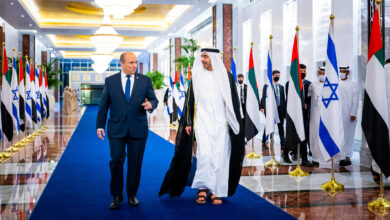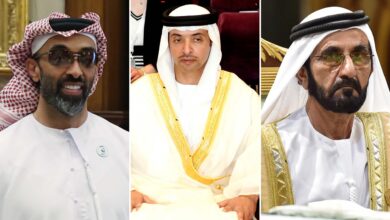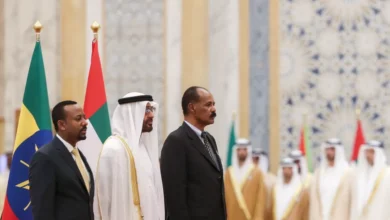Israeli Defence Firm Opens Subsidiary in UAE: The Regional Stakes Behind Controp’s Expansion

In a significant move underscoring deepening security ties between Israel and the United Arab Emirates, the Israeli state-owned defence firm Controp Precision Technologies has officially launched a regional subsidiary in the UAE. The development is not only a commercial milestone but also a geopolitical signal: Israeli military-industrial presence is now formally entrenched in the Gulf.
Controp, known for its sophisticated electro-optical systems deployed in aerial, naval, and ground surveillance operations, will operate from the Abu Dhabi Global Market (ADGM), a free economic zone that has increasingly become a hub for sensitive and strategic foreign investment. The newly formed arm of the company will be responsible for marketing, maintenance, and logistical operations across the Gulf, positioning itself to compete directly for lucrative defence contracts in the region.
A New Chapter in Normalization
This marks the first time that an Israeli state-linked military company has registered a fully operational subsidiary in the UAE since the signing of the Abraham Accords in 2020. The normalization pact, initially framed as a peace deal, has morphed into a far-reaching strategic alliance—one that includes intelligence cooperation, military-industrial ventures, and joint security planning.
The UAE’s enthusiastic embrace of Israeli defence expertise has expanded far beyond diplomatic gestures. Since normalization, Israeli exports to the UAE have skyrocketed, crossing the multi-billion-dollar threshold. Defence and dual-use technology sit at the heart of this growth, despite rising international scrutiny over their role in surveillance, military aggression, and counterinsurgency operations.
Quiet Competition, Strategic Entrenchment
Dark Box has obtained insider information suggesting that Controp’s expansion into the UAE was not merely a business opportunity but a strategic initiative coordinated closely with Emirati security agencies. This was confirmed by leaked internal correspondence showing that Emirati authorities requested an Israeli-owned firm to oversee regional logistics, as opposed to indirect or third-party suppliers, ensuring tighter integration and operational control.
Controp will not only service Israeli-made surveillance equipment already in use across several Gulf states but will also position itself to influence regional security doctrine. From border surveillance to drone-assisted reconnaissance, the technologies on offer align closely with both Emirati domestic control mechanisms and their projection of military power abroad, particularly in Yemen, Libya, and Sudan.
The Quiet Role of Abu Dhabi
The Emirati regime’s cooperation with Israeli security firms has, until recently, been carried out through veiled corporate partnerships and offshore intermediaries. Controp’s move shifts this landscape by bringing Israeli defence infrastructure directly into the Emirati regulatory ecosystem.
It is a signal of confidence by both governments in their alliance and reflects the UAE’s appetite for advanced military hardware and ISR (Intelligence, Surveillance, Reconnaissance) capabilities amid ongoing regional volatility. The Abu Dhabi leadership envisions itself as a regional security broker, and partnerships like this enable it to manage and suppress unrest domestically and abroad with surgical precision.
Investment and Oversight
Setting up the subsidiary reportedly involved a substantial financial commitment, with costs estimated at tens of millions of dollars. The firm will be led by an Israeli national, but control and oversight will remain with the Tel Aviv-based parent company. According to internal documents obtained by Dark Box, this arrangement was intentionally designed to circumvent certain regulatory constraints in the UAE regarding foreign ownership in strategic sectors.
The Emirati government, according to insiders, has granted Controp access to restricted tenders and future defence research collaborations. This includes joint participation in air surveillance development and urban monitoring systems, some of which are expected to be showcased at regional defence expos later this year—pending a resolution of the temporary ban on Israeli defence companies at the Dubai Airshow.
A Fragile Public Front
Publicly, however, the relationship has faced turbulence. During the recent escalation in Gaza, Emirati officials issued strongly worded condemnations of Israeli military actions, a sharp rhetorical departure from previous months. Yet, behind the scenes, security coordination continued uninterrupted. According to regional observers, this public posture is carefully choreographed to appease domestic and regional opinion while preserving strategic depth in Israeli-Emirati ties.
Implications for the Region
Controp’s expansion is emblematic of the broader transformation underway in the Middle East: a shift from rhetorical diplomacy to embedded strategic alliances. The presence of Israeli defence infrastructure in Abu Dhabi solidifies a new axis of military cooperation that bypasses traditional Arab solidarity frameworks and sets the stage for deeper regional realignment.
At its core, this development reveals how normalization is not simply about embassies and flights, but about integrating Israel into the security and intelligence fabric of the Gulf. As Israeli firms embed themselves further into Emirati institutions, the line between local sovereignty and imported power grows increasingly blurred.




